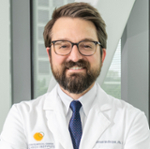Samuel McBrayer, PhD

Graduation Year: 2012
Advisor: Rosen, Steven
Current Position: Assistant Professor, University of Texas, Southwestern Medical Center
Samuel McBrayer is a Midwest native, growing up in North Muskegon, Michigan. He did his undergraduate degree at Baylor University in Waco, Texas before coming back to the Midwest for his PhD at Northwestern in the DGP (formerly IGP) in 2006. He joined the lab of Dr. Steve Rosen in the Department of Medicine, Division of Hematology-Oncology. Sam is currently an Assistant Professor at the Children’s Research Institute at the University of Texas Southwestern Medical Center.
What made you want to go to graduate school?
Although I entered college intending to pursue a career in medicine, I had a phenomenal experience conducting undergraduate biochemistry research in Dr. Bob Kane’s laboratory. This experience caused me to realize that pursuing a PhD would allow me to more directly foster my interests in biology and chemistry, and I elected to apply to graduate programs in biomedical research rather than medical schools.
What brought you to Northwestern and the IGP/DGP?
I appreciated the strong research environment at Northwestern and the fact that very impactful basic and translational research was being conducted there. I knew early on that I would like to apply my background in biochemistry to addressing fundamental questions related to cancer biology and then extend those studies into clinically relevant disease models. Northwestern seemed like the ideal place to pursue that goal.
What did you study in graduate school?
I studied cancer biology at Northwestern under the mentorship of Dr. Steve Rosen, who was the director of the Lurie Cancer Center at the time. My particular emphasis was on cancer metabolism, a theme that permeates the research we conduct in my own lab today.
What did you study in your postdoc?
After graduating from Northwestern, I joined the laboratory of Dr. William Kaelin at the Dana-Farber Cancer Institute and Harvard Medical School. In the Kaelin lab, I sought to understand how mutations in metabolic genes commonly observed in human gliomas influence the tumor cell metabolome. We ultimately identified an oncogenotype-specific metabolic vulnerability in gliomas that is currently being targeted in an ongoing clinical trial.
What are your current research and/or teaching interests? How have they changed over time?
My overarching interest lies in understanding how metabolic alterations influence cell fate decisions and treatment response profiles in cancer. We specifically focus on glioma biology because of the clear link between altered metabolism and brain tumor initiation and because new therapies are desperately needed to combat this disease.
How did Northwestern prepare you for your current career?
Northwestern provided an ideal setting to pursue my interest in cancer biology and, more generally, exposed me to exceptional biomedical research. The professors that guided me through my doctoral studies, including Dr. Rosen and members of my thesis committee, were clearly invested in my success. I am deeply indebted to them for their mentorship.
What is the most rewarding part of your job?
Two parts come to mind immediately. One is making new discoveries in the lab that present opportunities to either expand our understanding of cancer biology or directly benefit patients with brain tumors. The second is mentoring trainees in the lab and facilitating their maturation as scientists and critical thinkers.
What is the most challenging part of your job?
Achieving the seeming mirage of work-life balance is a challenge.
What advice would you give to current students interested in pursuing careers in academics?
Learn how to fail productively. Many experiments and ideas you have as a researcher will not pan out for one reason or another. Learning to design experiments in a way that they tell you something even when they don’t work out is critical. Also, resilience is one of the key attributes common to most (all?) successful scientists. Focus on developing resilience as early in your career as possible.
Any final advice for students?
Learn how to write and code effectively. Those are two skills that are game changers. They will also serve you well regardless of the direction your career path takes.